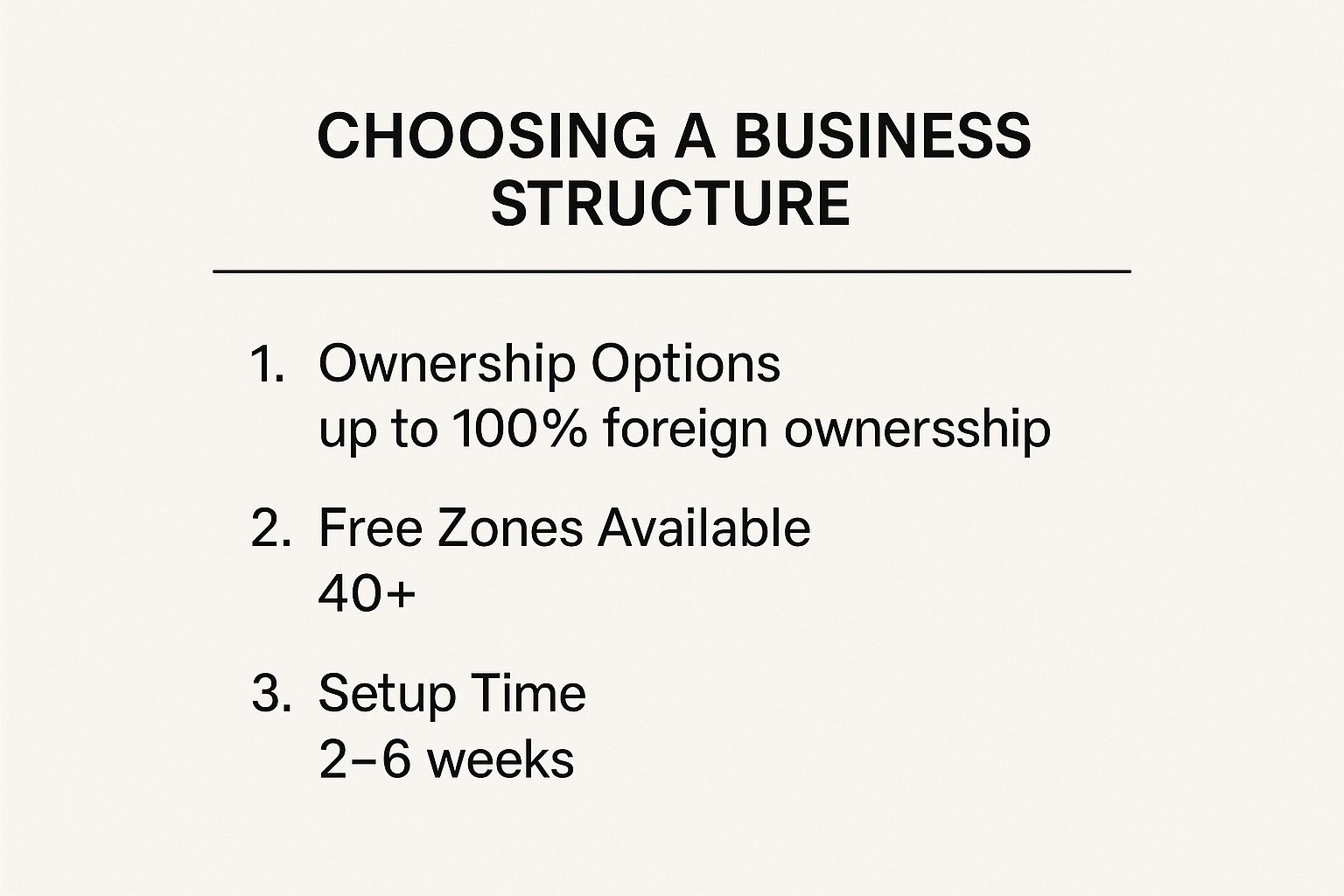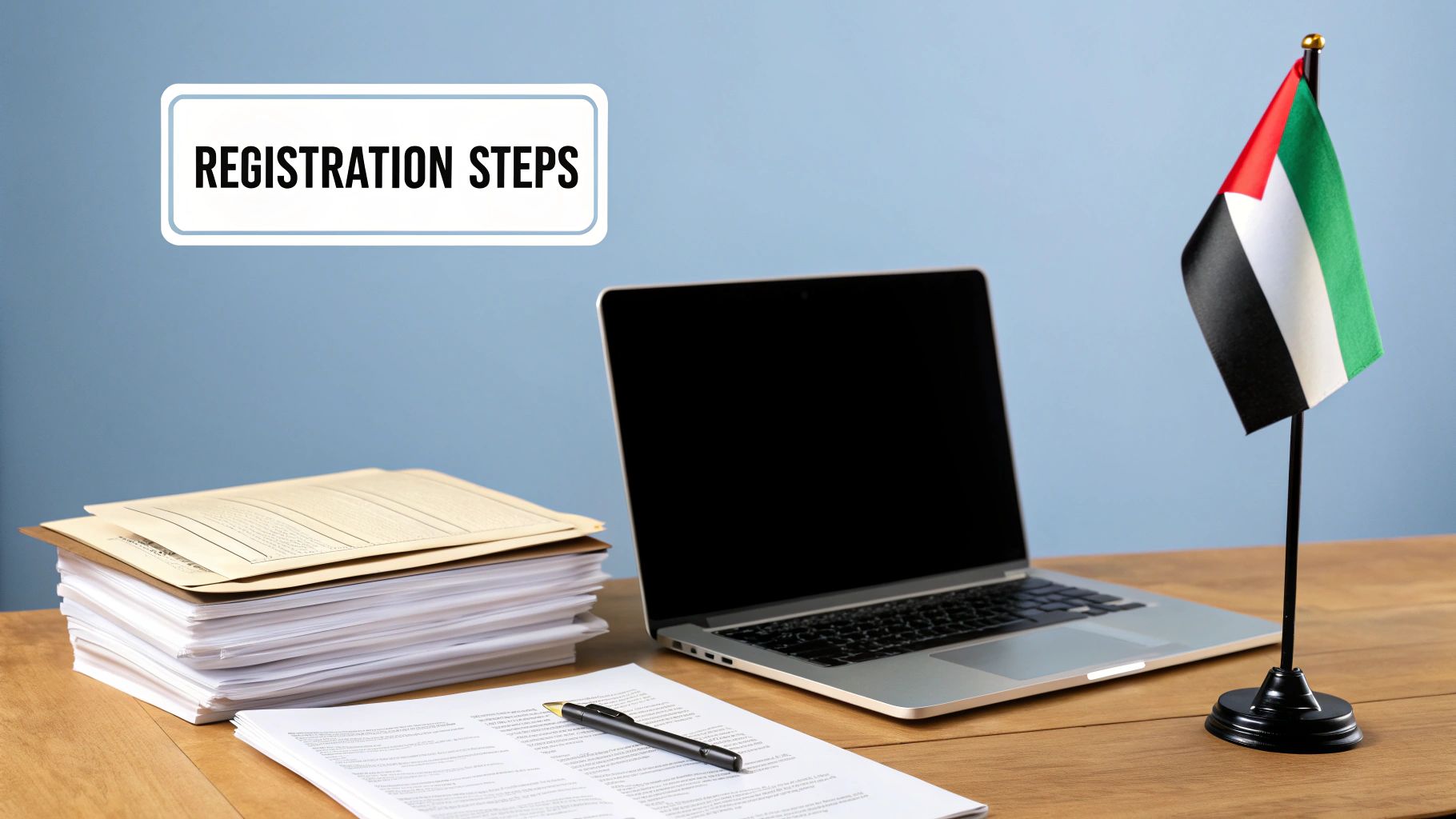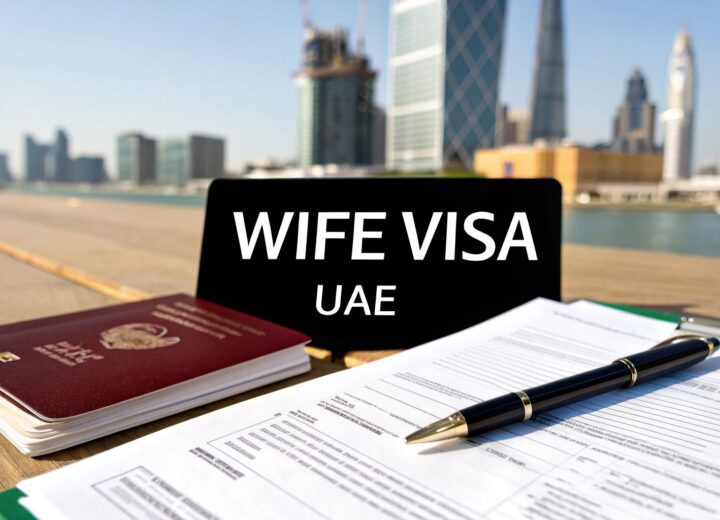So, you're thinking about setting up a business in the UAE. It’s a smart move. Essentially, company formation here is the legal process of registering your business, which lets you operate in one of three main jurisdictions: Mainland, a Free Zone, or Offshore.
The real trick is picking the right one for your specific goals. Are you looking to trade directly with the local UAE market? Or is your focus on international operations where you can really make the most of the tax advantages? Getting this choice right from the start is crucial.
Why Start Your Business in the UAE?
Thinking of launching your business in the UAE? You're in good company. The country has seen an explosion in new businesses, with the number doubling in just the past five years. This isn't a coincidence; it's the result of a deliberate, business-first strategy that continues to attract entrepreneurs from all over the world.

A Pro-Business Economic Landscape
The UAE government has worked hard to create an environment where businesses don't just survive, but actually thrive. This goes way beyond low taxes; it's a complete ecosystem built for economic stability and growth. With a rock-solid financial sector, world-class infrastructure, and transparent legal frameworks, you have a secure foundation to build your venture on.
What’s more, the government's push to diversify the economy away from oil has flung open the doors to massive opportunities in sectors like tech, renewable energy, tourism, and logistics. This forward-thinking approach means the economy is built for the long haul, making it a reliable and sustainable base for any international entrepreneur.
The core advantage of the UAE is its blend of stability, world-class infrastructure, and a genuinely pro-business regulatory environment. It’s a place where entrepreneurs are not just welcomed but actively supported.
Unlocking Tax and Ownership Benefits
Let's be honest, one of the biggest draws for setting up a company in the UAE is the incredibly favourable tax system. For international entrepreneurs, the benefits can be a game-changer, allowing you to create a financially lean structure for your global operations.
Here's a quick rundown of the key perks:
- Zero Personal Income Tax: That's right. You keep 100% of your personal earnings.
- Low Corporate Tax: A very competitive corporate tax rate only kicks in on profits that exceed a pretty high threshold.
- Full Profit Repatriation: You have the freedom to send 100% of your profits and capital back to your home country, no questions asked.
- 100% Foreign Ownership: The game has changed. For most Free Zones and a huge number of Mainland activities, you no longer need a local partner. This gives you complete control over your business.
When you add all these up, it creates a powerful incentive that lets you pour more of your capital back into growing your company.
The Power of Professional Guidance
While the UAE is incredibly business-friendly, the setup process can be complex if you don't know the ropes. This is where partnering with a specialist really pays off. You need someone who understands the subtle differences between Mainland company formation in Dubai, Sharjah, and Abu Dhabi.
Expert consultants can also help you navigate the vast landscape of UAE Free Zones, making sure your specific business activity is perfectly matched to the right jurisdiction.
But it doesn’t stop at the initial setup. Good advisors provide ongoing support for critical things like securing your Investor Visa or even the coveted Golden Visa. With 24/7 support and access to Corporate PRO services for all your compliance needs, you can focus on what you do best—running your business—while the administrative headaches are handled for you. This kind of guidance ensures your entry into the UAE market is smooth, cost-effective, and legally sound.
Choosing Your Jurisdiction: Mainland vs Free Zone
When you decide to set up a company in the UAE, your first big question won't be about your business plan or finding an office. It will be: Mainland or Free Zone? This is the single most important decision you'll make, and it's not just about a physical address. It’s a strategic choice that defines who you can do business with, your ownership structure, and your company's potential for growth.
Getting this right from the start lays the foundation for everything else. Are you planning to tap into the local UAE market, trading directly with customers and bidding for government projects? Or is your business geared towards international trade, where things like 100% profit repatriation are the main draw? Let's get into the practical differences to help you figure out which path is right for you.

With over 40 Free Zones and increasingly flexible ownership rules, the options are vast, and thankfully, the setup times are quicker than you might think.
The Case for a Mainland Company
Opting for a Mainland company means you're registering directly with the Department of Economic Development (DED) in your chosen emirate, whether that's Dubai, Abu Dhabi, or Sharjah. The biggest advantage here is simple: total market access. A Mainland licence gives you the freedom to operate anywhere in the UAE without any restrictions.
This is a huge deal. If you're opening a restaurant, a retail store, or offering services directly to the local market, a Mainland setup is almost always the way to go. It also opens the door to bidding on valuable government contracts, a major plus for many industries.
Not long ago, this meant needing a local Emirati sponsor. But recent legal reforms have been a complete game-changer for foreign investors. For most business activities, 100% foreign ownership is now possible on the Mainland. This shift offers the best of both worlds—you get complete control over your business while enjoying full access to the local economy.
Diving into UAE Free Zones
Scattered across the UAE are more than 40 specialised Free Zones. Each one is its own economic jurisdiction with a unique set of rules and regulations, often designed as a hub for specific industries like tech, media, commodities, or logistics.
The appeal for international businesses is undeniable. Here’s why so many entrepreneurs flock to Free Zones:
- 100% Foreign Ownership: This has always been the main attraction, guaranteeing you full control of your company from day one.
- Full Profit Repatriation: You can send 100% of your profits and capital back home without facing any restrictions.
- Tax Exemptions: Free Zones generally offer a zero-rate on corporate tax for qualifying income and exemptions from import and export duties.
But there’s a catch. A Free Zone company is typically limited to doing business inside its designated zone or internationally. If you want to trade directly with the UAE Mainland market, you’ll usually need to go through a local distributor or agent.
Mainland vs Free Zone Company At a Glance
To really get a feel for the differences, it helps to see the key features side-by-side. Your final choice will come down to what your business does, who your customers are, and where you see your company in five years. A global e-commerce brand has very different needs than a local construction firm in Abu Dhabi.
| Feature | Mainland Company | Free Zone Company |
|---|---|---|
| Business Scope | Trade anywhere in the UAE and internationally. Eligible for government contracts. | Operate within the specific Free Zone and internationally. Mainland trade requires a distributor. |
| Ownership | Up to 100% foreign ownership for most activities. Some strategic sectors may still require a local partner. | 100% foreign ownership is the standard across all Free Zones. No local sponsor needed. |
| Office Space | A physical office space registered with the DED is mandatory. | Flexible options are available, from flexi-desks and shared offices to dedicated physical offices. |
| Visa Eligibility | Visa allowance is generally linked to the size of the physical office space. | The number of available visas is often determined by the licence package and office type chosen. |
| Regulatory Body | Department of Economic Development (DED) in the respective emirate (e.g., Dubai, Sharjah). | Each Free Zone has its own independent governing authority (e.g., DMCC, KIZAD). |
| Typical Costs | Generally higher initial setup costs due to office requirements and various approvals. | Often more cost-effective, with packaged solutions that bundle the licence, registration, and basic facilities. |
Making the right call here really benefits from expert advice. For instance, a specialist in Mainland Company Formation in Dubai can navigate the DED's specific requirements, whereas an expert in Freezone Company Formation can help you pick the perfect zone from the 40+ options available. This guidance is crucial to make sure your legal setup perfectly matches your business goals from the very beginning.
Alright, you’ve picked your battleground—Mainland or Free Zone. Now it's time to get into the nitty-gritty of giving your business its official identity. This means choosing a legal structure, locking down a trade name, and getting the right business licence.
Think of this as the essential paperwork phase. It’s less about grand strategy and more about precision. Get these details right from the start, and everything else, from opening your corporate bank account to sponsoring visas, will fall into place much more smoothly.

Choosing Your Legal Structure
How you structure your company legally is a big deal. It dictates ownership, liability, and the rules you operate by, so it really needs to match your business plans. For most entrepreneurs here in the UAE, the choice boils down to two popular options: the Limited Liability Company (LLC) or the Sole Establishment.
A Limited Liability Company (LLC) is a go-to for many, whether you're setting up on the Mainland or in a Free Zone. Why? Because it creates a separate legal entity, which means your personal assets are shielded from business debts. It's a flexible setup that allows for multiple shareholders and works for almost any kind of commercial or industrial business.
On the other hand, a Sole Establishment is perfect for the solo entrepreneur, especially if you're in a service-based field like consulting, design, or coaching. With this structure, you're the single owner and are personally liable for the company. It's simpler to get going, but that liability distinction is crucial.
Whichever path you take, a foundational document you'll encounter, particularly with LLCs, is the Memorandum of Association. This legal document lays out the company’s constitution, shareholder agreements, and business objectives.
Securing Your Trade Name and Initial Approvals
Before any licence can be issued, your business needs a name. The UAE has some clear-cut rules about this, so it pays to have a few compliant options ready.
Here are a few key guidelines to keep in mind:
- Be Unique: The name can't already be taken by another company in the same emirate. A quick search can save you a lot of hassle.
- Keep it Professional: Your name can't violate public morals or be considered offensive.
- Stay Relevant: It should give a clue about what your business actually does.
- Add the Suffix: You have to include the legal form's acronym at the end, like LLC or FZE (Free Zone Establishment).
Once you've brainstormed a few names, your setup consultant will submit them for approval. This goes to the Department of Economic Development (DED) if you're on the Mainland, or to the specific Free Zone authority. After your name gets the green light, the next step is getting the Initial Approval—basically, the government's official nod to proceed.
Obtaining the Correct Business Licence
This is what it's all about: the business licence. This is the official document that lets you legally operate in the UAE. The licence you need is tied directly to your business activities.
The UAE’s business scene is booming. Recent figures show the country has blown past 1.5 million active commercial licences, with over 200,000 new ones issued in 2024 alone. This incredible growth, which includes a 16% jump in new mainland licences in Abu Dhabi, highlights just how efficient the system has become for getting entrepreneurs up and running.
There are three main licence categories you’ll encounter:
- Commercial Licence: This is for any business involved in trading—buying and selling goods. Think e-commerce stores, import/export companies, or retail shops.
- Professional Licence: Tailored for service providers and skilled professionals. If you're a consultant, a marketing agency, or a freelance designer, this is the one for you.
- Industrial Licence: This is for businesses that are actually making things—manufacturing, processing, or assembling products.
Real-World Scenario: Let's say a tech expert wants to offer software development services in Dubai. They would need a Professional Licence and would likely set up as a Sole Establishment. But if an entrepreneur wants to import and sell home goods online, they'd need a Commercial Licence and would almost certainly form an LLC to protect their personal finances.
Getting that licence involves a detailed application, submitting copies of your passport, a solid business plan, and your signed Memorandum of Association. The exact requirements for a https://prodesk.ae/dubai-trade-license/ can vary, so paying attention to the details is key. This is where leaning on professional PRO services can be a game-changer, making sure every document is spot-on to avoid any frustrating delays.
Securing Your Investor and Golden Visas
Getting your company formation in the UAE signed, sealed, and delivered is a huge milestone. But for international entrepreneurs, it's really just the beginning of the story. The next crucial move is securing your residency. This step is what turns your business from a name on paper into your personal gateway for living and working in one of the world's most exciting economies.
Essentially, your new business licence becomes your ticket to a new life in the Emirates. It’s the key that unlocks your personal residency status. For most business owners, the first stop is the Investor Visa, a standard route that grants you the right to live here. The process is well-defined but demands precision, involving key steps like a medical fitness test and your Emirates ID application.
The Standard Investor Visa Pathway
Once your company’s establishment card is issued, you're clear to officially start your visa application. The Investor Visa is tied directly to your position in the company you just built. It’s a path many have walked before, but one where even tiny mistakes can lead to frustrating delays.
The general flow looks something like this:
- Entry Permit: Your new company applies for an entry permit for you. This allows you to be in the country specifically to process your residency.
- Status Change: If you’re already in the UAE on a tourist visa, you'll need to do what's called a "status change" to activate this new permit.
- Medical and Biometrics: Next up are the non-negotiables: a mandatory medical fitness test and providing your biometric data for your Emirates ID.
- Visa Stamping: The final step is getting that residence visa sticker placed in your passport. Congratulations, you're now officially a UAE resident.
While it sounds straightforward, juggling the paperwork, appointments, and timelines requires a sharp eye for detail. This is often where professional support makes all the difference, making sure every box is ticked correctly and on time. For a deeper dive, check out our full guide on the UAE Investor Visa requirements.
Pursuing the Prestigious Golden Visa
Beyond the standard route, the UAE offers an even more attractive option for those with a long-term vision: the Golden Visa. This is a long-term residency programme, usually for 10 years, designed to attract and keep top-tier talent, successful entrepreneurs, and major investors. It gives you and your family a level of stability that's hard to beat.
A huge advantage is that the Golden Visa isn't tied to your company's annual licence renewal. This provides a greater sense of freedom and peace of mind for anyone serious about building a lasting presence here.
The Golden Visa is more than just a long-term residency; it's a statement of commitment from both the UAE and the investor. It signals a long-term partnership, offering stability that allows entrepreneurs to focus entirely on growth without worrying about annual renewals.
Qualifying for the Golden Visa
There are a few different ways to qualify for this elite visa status, but two pathways are especially relevant for new business owners and investors in the UAE.
1. The Entrepreneur Category
This route is tailored for founders of successful startups. To qualify, you’ll usually need to meet certain criteria, like having a project with a minimum capital of AED 500,000 or getting the green light from an accredited business incubator in the country. It’s a pathway that directly rewards innovation and proven business acumen.
2. The Property Investor Category
Another very popular route is through real estate. You can qualify for a Golden Visa by purchasing a property (or a portfolio of properties) with a total value of at least AED 2 million. The critical condition here is that the investment must be made without a loan, and you have to hold onto the property for a specific period. This is a fantastic option for investors who want to lock in their residency while building a tangible asset portfolio in the UAE's booming property market.
Whether you're aiming for the standard Investor Visa or the coveted Golden Visa, navigating the specific requirements demands specialised knowledge. Working with a team that has deep expertise in both visa types ensures you choose the right path from the start and that your application is handled flawlessly, securing your future in the UAE.
Your Operational Toolkit After Setup
Getting your trade licence is a huge milestone on your company formation journey in the UAE. It’s the official green light, but it’s also where the real work of running your business begins. To move smoothly from setup to success, you need the right tools to handle the day-to-day admin and financial tasks.
Think of this next phase as building the engine for your new company. It means tapping into specialised support for government formalities and laying a solid banking foundation. Without the right expertise, you'll burn valuable time navigating complex government portals instead of focusing on growth.
The Crucial Role of Corporate PRO Services
Once your company is up and running, you'll find yourself dealing with various government bodies like the Ministry of Labour, the Immigration Department, and the Department of Economic Development. This is where a professional Public Relations Officer (PRO) becomes your most valuable asset. Their job is to be your official representative, making sure your business stays compliant and runs without a hitch.
This kind of support is vital for ongoing operational needs, such as:
- Visa Management: Handling applications, renewals, and cancellations for your employees and their families.
- Labour and Immigration: Processing labour cards, Emirates IDs, and managing all the related paperwork.
- Document Clearing: Submitting and clearing documents with all the different government departments.
- Licence Amendments: Helping with any changes to your trade licence, like adding a new business activity or changing partners.
By outsourcing these tasks, you save countless hours. More importantly, you avoid the costly mistakes that can easily happen when you try to navigate these processes alone. It's about having an expert on your side who knows the system inside and out.
Navigating Document Attestation
In business, you'll often need to use documents issued from outside the UAE. These could be anything from educational certificates and marriage certificates for family visas to corporate documents for setting up a branch. For these to be legally recognised by UAE authorities, they must go through a process called attestation.
This involves getting the document certified by various government bodies, both in its country of origin and within the UAE. It’s a detailed, multi-step process that can be incredibly time-consuming. Professional attestation services handle this entire chain of verification for you, ensuring your crucial documents are legalised and ready for official use, hassle-free.
Opening Your Corporate Bank Account
A corporate bank account is absolutely essential for doing business, but it can be one of the trickiest post-setup hurdles. UAE banks have very strict compliance and due diligence requirements, and applications are often rejected because of incomplete paperwork or failing to meet the bank's criteria.
A common hurdle is demonstrating sufficient "substance"—proving your business has a real physical presence and legitimate operations in the UAE. Banks want to see a tangible connection to the country, not just a registration number.
To boost your chances of a smooth approval, you need to be prepared. This means putting together a comprehensive file with your trade licence, memorandum of association, passport and visa copies for all shareholders, and a detailed business plan. An expert consultant can provide invaluable assistance with opening your business bank account in Dubai, helping you pick the right bank and prepare an application that ticks all the boxes.
Once you’re operational, exploring financial strategies like UAE Invoice Factoring can also provide critical cash flow solutions.
This proactive approach is more important than ever. The company formation landscape in the UAE saw a remarkable 25% increase in new company registrations in 2024 compared to the previous year. This growth is fuelled by reforms allowing 100% foreign ownership and flexible visa schemes, making the region a top destination for entrepreneurs. Having your operational toolkit ready from the start ensures you can fully capitalise on these opportunities.
Common Questions on UAE Company Formation
When you're looking into company formation in the UAE, it's natural for a handful of questions to pop up again and again. Getting clear, straightforward answers is the first step to making the right decisions for your new venture. Let's walk through some of the most common queries we hear from entrepreneurs.

How Much Does It Cost to Set Up a Company in the UAE?
This is usually the first question on everyone's mind, and the honest answer is: it really depends. The final cost can shift quite a bit based on the choices you make.
The biggest factors are your jurisdiction (Mainland vs. Free Zone), the specific business activity you're pursuing, how many visas you'll need, and what kind of office space you require. A Free Zone setup can start from around AED 15,000, while a Mainland company typically has higher upfront costs.
To steer clear of surprises, it's crucial to get a detailed quote that breaks everything down—licence fees, registration, visa costs, and any professional service charges. A specialist can help you find a cost-effective package that matches your budget perfectly.
Can I Get a UAE Residence Visa If I Open a Company?
Absolutely. In fact, setting up a company is one of the main ways to secure a UAE residence visa. As the business owner, you become eligible to apply for an Investor Visa, which is your key to establishing residency here.
The number of visas your company can sponsor is usually tied to its size and the office space it holds. The whole process kicks off right after your company’s establishment card is issued. From there, you'll apply for your entry permit, undergo a medical test, and provide biometrics for your Emirates ID before the visa is finally stamped in your passport.
A key takeaway is that your business is not just a commercial entity; it's your personal gateway to living and working in the UAE. The two are intrinsically linked, making the visa process as important as the company registration itself.
Do I Need a Local Sponsor for My Business in the UAE?
The rules on this have changed dramatically for the better in recent years. For the vast majority of business activities on the UAE Mainland, 100% foreign ownership is now allowed. This is a huge shift, as it means you no longer need an Emirati sponsor holding a 51% share of your company.
Of course, there are a few exceptions. Certain strategic or regulated sectors might still require a local partnership. In any UAE Free Zone, however, 100% foreign ownership is the standard, so the need for a local sponsor is completely off the table. An expert in company formation can give you the most up-to-date advice for your specific industry.
What Is the Difference Between a Commercial and Professional License?
Getting this right is fundamental to structuring your business correctly from day one.
A Commercial License is for any business that involves trading—basically, buying and selling goods. This covers everything from general trading and retail shops to complex import/export operations.
On the other hand, a Professional License is for service-based businesses where individuals are offering their expertise. Think consultants, designers, artisans, and other skilled professionals.
One of the main legal differences on the Mainland is that a Professional License often allows for 100% foreign ownership but requires you to appoint a Local Service Agent (LSA). The good news is that an LSA holds no shares and has no say in how you run your business.
Ready to turn your business vision into a reality in the UAE? Let the experts handle every detail of your company formation, from licensing and visas to ongoing PRO services.
✅ Specialists in Mainland Company Formation in Dubai, Sharjah & Abu Dhabi
✅ Specialists in Freezone Company Formation across the UAE
✅ Specialists in Golden Visa on Property and Investor Visa
✅ Specialists in Corporate PRO Services and Attestation Services
✅ 24/7 Support Service – Always here when you need us
✅ Cost-Effective Business Setup Solutions tailored to your needs
✅ Enjoy UAE Tax Benefits for International Entrepreneurs
📞 Call Us Now: +971-54-4710034
💬 WhatsApp Us Today for a Free Consultation





